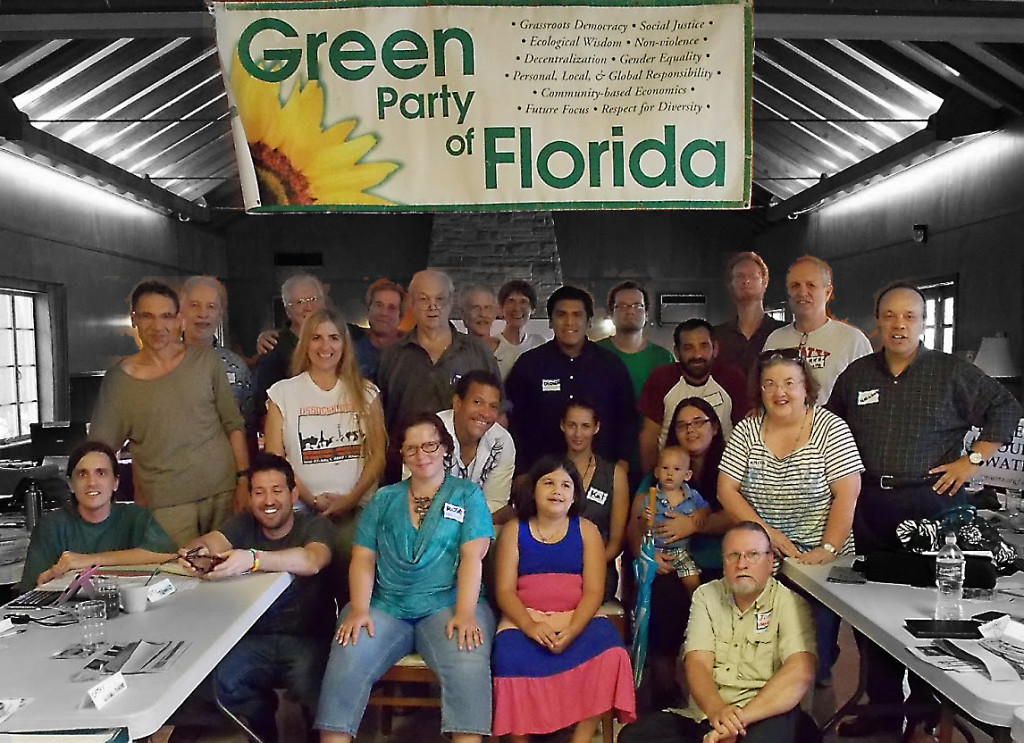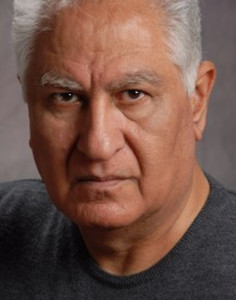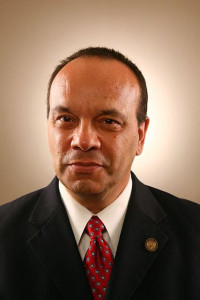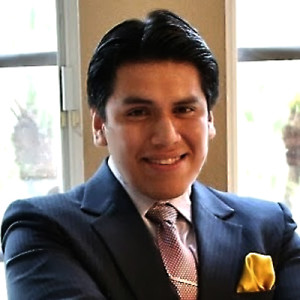“I was really impressed with the weekend, it made me really happy,” related Cathy Gilbert, the newly-elected Female Co-Chair of the Green Party of Florida (GPFL). The long-time Green continued, “The discussions weren’t just worthwhile for getting business done, but they actually excited and energized people. Folks who had never met face-to-face had the chance to talk in person, to actually get to know their partners from around the state. Their commitment was apparent, and I could see that people are working in their locals with a lot of passion.”
Some 30 members had just wrapped up three days of deliberations (June 6 – 8) in Orlando, Florida, at the Quaker Meeting House on Friday and Saturday, and at the Latino Leadership center on Sunday. The weekend began with concerns over the state of the party. The GPFL is small, it had lost several officers in the course of the past year, and heavy issues over the character of the party itself remained unresolved.
But attendees emerged hopeful, pleased by the creation of new affiliates in Broward and Orange counties, many new faces among the old, with a mix of seriousness and camaraderie shown in tackling the hard and potentially divisive issues.
Some of those issues are still unresolved.
The heart of Saturday morning’s session was the reports from the locals on their plans for the coming year. The St. Pete local featured a report by its secretary Jeff Roby, who presented a plan (see the Plan) to develop a package of bills for the Florida state legislature, including:
- The Nobody Dies for Being Poor bill — that nobody should be denied life-saving medical services, drugs or otherwise, based on ability to pay.
- The Nobody Gets Foreclosed for Being Sick bill. Nobody gets driven from their home for being wiped out by medical expenses.
- The Down with Blood-Sucking Debt Collectors bill.
- The Fair Play for Students bill.
The reports were interspersed with talks by this year’s party candidates:
- Henry Lawrence for State House District 6, in the Florida panhandle’s Bay County.
- Randy Toler for at-large School Board (non-partisan) in Tampa’s Hillsborough County.
- Didier Ortiz, running in Fort Lauderdale (Broward County) for the non-partisan City Commission, District 3.
An added feature later in the day was a talk by independent (No Party Affiliation) candidate for Governor Farid Khavari. The centerpiece of Khavari’s is a plan for a publicly owned SuperBank, which he claims “can reduce interest costs of home ownership and student loans by 75% at no cost to taxpayers, and create hundreds of thousands of jobs.”
The next day, the assemblage considered whether or not the GPFL should formally endorse Khavari. Many were concerned by his stands on various social issues such as the death penalty, and they were reluctant to break party tradition by endorsing a candidate not registered Green. Others were excited by his plan for a Florida SuperBank, noted that the GPFL did not have its own gubernatorial candidate, and thought that the party could grow off Khavari’s campaign.
This promises to be a hot topic for the party in coming months.
Things started buzzing
The most spirited discussions came late Saturday afternoon around two presentations under the heading of “Leadership Style, Structure and Decision Making. The first, by Rose Roby and Jeff Roby took on the book Swarmwise by former Swedish Pirate Party leader Rick Falkvinge, and its applicability to the GPFL (see my article Remarks on Swarmwise, Part 1 and Part 2). According to Falkvinge, “the swarm quickly learns which solutions work and which don’t. The workflow becomes an iterative, evolutionary process of trial and error, of constantly adapting and improving, without anybody’s supervision to make it happen. Being open and inviting is a key defining feature of a swarm.”
 While the concept’s adherents overemphasize (in my opinion) the magic of Twitter and the electronic media, it also unleashes energy all too often constrained by more bureaucratic modes of organization. Some argued that th4e GPFL needed to focus on strengthening its rules and procedures, while others of us felt that locals and even Executive Board members had a great range of initiatives they could take without needing authorization from the party bureaucracy.
While the concept’s adherents overemphasize (in my opinion) the magic of Twitter and the electronic media, it also unleashes energy all too often constrained by more bureaucratic modes of organization. Some argued that th4e GPFL needed to focus on strengthening its rules and procedures, while others of us felt that locals and even Executive Board members had a great range of initiatives they could take without needing authorization from the party bureaucracy.
The next presentation was given by Orlando’s Jim Howe, who argued that the party’s decision-making should give the greatest weight to its activists, the ones who got the work done, along the lines of a vanguard party. Others, most clearly expressed by Rich Carpenter of the Tampa local, argued that the GPFL had to be a mass organization. The upshot of that was even extended to giving all the party’s 6,000 registered Greens full online voting rights on state party decisions. A third position was that while the GPFL was not, could not be a vanguard party, at this point in its history it needed to operate as an organizing committee, just as the mass trade unions had organizing committees in their early development.
One common opinion was expressed by Nelson Betancourt. ““I was very moved by the vibrancy of the people there, and really encouraged by the people running for office like Didier Ortiz, Henry Lawrence and Randy Toler,” stated Betancourt, 61, a member of the party’s new Orlando affiliate and a key organizer for the weekend event. “I would have liked us to have finally answered the question of whether we are to be an activist party, or a mass party, as that seemed to have been the most pressing question. We are always going to have some people more engaged than others, whether out of a sense of duty or personal conviction, and that has to be respected. At the same time, the State Meeting is open for every registered Green to attend and vote. We also talked about the Executive Board and the need for leadership, not a matter of telling people what to do, but of encouraging them, proposing possibilities for integration and cooperation. I personally think leadership should be weighted to those who are most active in their locals, with the locals working to bring along those less involved and to create opportunities for them to become more engaged. At least we started that conversation, and that’s the important thing.”
Betancourt, of Colombian background, began his political work as an activist in the anti-war, civil rights and environmental movements. He explained how he had been particularly moved by Aldous Huxley’s Brave New World, how the people were narcotized by the entertainment industry, and by George Orwell’s 1984, showing how the state used ideology for shutting down thinking. He works now as a teacher and a community organizer, and is the head of the non-profit organization Awakening Art and Culture, which is dedicated to “artistry, heritage, imagination and the public interest.”
Great expectations
The issue was taken up again Sunday morning during a “Discussion of role of, and expectations for, co-chairs.” Long-time members stressed adherence to the Party bylaws, which give the Board broad, vague responsibilities, with no decision-making authority enabling it to carry out those responsibilities, going so far as to read them to the gathering. Newer members, along with some older ones, seemed to hold that leadership was not derived from rules and bylaws, but from the capacity to lead, to organize. They wanted the new crop of officers to do just that.
Then the elections. Some of the results:
Co-Chairs: Cathy Gilbert and Josh Pritchett
Secretary: DJ Chandler
Treasurer: Harry Patterson (the one officer incumbent)
Joining them on the Executive Board will be:
Henry Lawrence (re-elected)
Steve Showen (re-elected)
Richard Hillwig (new member from the Orange County local)
Spokespersons:
Kat Duerr
Didier Ortiz
The new face(s) of the party
 The makeup of the Board overall is younger, with the addition of DJ Chandler, Josh Pritchett and Richard Hillwig. The younger, more multi-racial face of the party was clearest in the selection of the new spokespersons (a position held in the last year by the co-chairs), who are very excited by the party’s prospects. That future is foreshadowed by the fact that newer members aren’t just talking. Hillwig, Silvie Surie (Broward), Victor Agosto (Broward), Betancourt, Bill Pollard (Highlands), and Dan Griffith are getting on various GPUS committees as members or observers, explicitly to “learn the ropes”, with Surie, Duerr and Ortiz becoming observers on the GPUS National Committee.
The makeup of the Board overall is younger, with the addition of DJ Chandler, Josh Pritchett and Richard Hillwig. The younger, more multi-racial face of the party was clearest in the selection of the new spokespersons (a position held in the last year by the co-chairs), who are very excited by the party’s prospects. That future is foreshadowed by the fact that newer members aren’t just talking. Hillwig, Silvie Surie (Broward), Victor Agosto (Broward), Betancourt, Bill Pollard (Highlands), and Dan Griffith are getting on various GPUS committees as members or observers, explicitly to “learn the ropes”, with Surie, Duerr and Ortiz becoming observers on the GPUS National Committee.
“This meeting marks a new opportunity for all of the local chapters to work as one,” said Didier Ortiz, a candidate for City Commission, District 3, in Broward County’s Fort Lauderdale. “I felt that there was a new wave of energy injected into the heart of the Green Party of Florida. There was not a single person who did not contribute freely to our future strategy.”
Didier’s campaign supports the community’s drive to “Ban the Box,” i.e., remove the checkbox from job applications about whether one has ever been convicted of a felony. He calls for the city to issue municipal ID’s, an important demand of the Latino community which would enable immigrants to fully exercise their rights. Didier is also fighting for the $15/hour minimum wage, and for Fort Lauderdale to create enterprises such as city-owned shopping centers.
Didier, of Peruvian background, was first politicized by the immigration issue, and how his parents were harmed by discrimination, institutional racism, and capitalism in general. He became political while a senior in high school, became “more aware” in college where he received a Political Science degree, was politicized by the wars in Iraq and Afghanistan, and worked with Students for Justice in Palestine, the Dream Defenders (who have led the fight against Florida’s racist Stand Your Ground law), and Florida New Majority, which seeks to get minorities to the polls and into public office. He joined the Green Party of Florida after being invited by Broward leader Victor Agosto.
Didier explained, “Americans are looking for a party that means what it says and says what it means.”
“I thought the meeting was fantastic,” said newly-elected spokesperson Kat Duerr, 27, a member of the party’s recently formed Orlando affiliate who served as facilitator for the affair. “I have to admit I was a little nervous going in, but I was delighted to see people so eager to work together for solutions. The conversations were both healthy and productive, and I think they addressed what needed to be addressed. I believe we’re staking out new ground in how the party deals with the issues facing us.”
Duerr currently teaches pre-school in Orlando. She was an animal rights activist at age 13, studied anarchism at 16, and went on to start Bags of Hope Orlando, a charity which gives care packages of bottled water, food and sanitary items to the homeless.
“I was inspired by January 25, 2011 protests in Egypt, and I had heard about Occupy,” related Duerr, who went on to become a core organizer for Occupy Orlando and took part in their three-month occupation of Orlando’s Beth Johnson Park. “Occupy is where my heart is, but I recognized that we still had to work to a degree within the system, so I turned to Green Party.”
A final word
“This is an important moment in history,” said Rose Roby, chair of the St. Pete local. “At this moment, the liberals are freaking out over Republican star Eric Cantor being upended in the primaries by an unknown Libertarian operating on a shoestring. Why are they lamenting the downfall of this vicious right-winger? Because deep in their hearts, they know that their base is also getting angry, and they could be next!”






